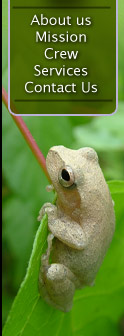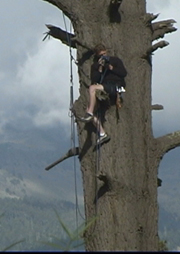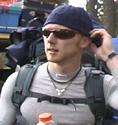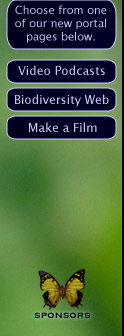


 Jonas Stenstrom
Jonas Stenstrom
My great interest in nature and biology really first started when I began my BS in science and marine biology at James Cook University, Australia. Located in the tropical regions of Australia, I got a chance to participate in many voluntary projects working in everything from gliders in eucalyptus forests to starfish on the tropical coral reefs.
In 1999 I started working as a marine biologist guide on the reefs off Airlie Beach on Australia's east coast. The following year I continued working as a combined marine biologist and Divemaster, organizing and supervising dive and adventure tours on the Great Barrier Reef. After returning to Sweden, I started working as a guide at Sweden’s National Science Center, teaching visitors about science in areas such as the oceans and rainforests. I also began working on an ecotoxicological project through Gothenburg University, investigating the toxic effects of a group of polycyclic-aromatic hydrocarbons (PAHs) to natural assemblies of marine micro algal communities. My study was a part of a larger international project (called BEAM) funded by the European Union set out to study the toxic effects of a large number of chemical pollutants on the marine environment. In these days, the health of the oceans are unfortunately jeopardized by human impacts such as oil spill, use of toxic boat paints and pollution runoff from land. Since chemicals generally never occur individually but often in complex mixtures, it was important to investigate possible mixture effects and if such effects can in anyway be predicted in environmental risk assessments. For my masters project I studied the regeneration ability of echinoderm appandages and neural system.
My passion for the great outdoors and adventure drives me to always move on to new challenges. Teaching science to both school kids as well as adults and inspire them to get out and get active is to me, one of the biggest kicks in life. I currently teach evening classes in marine science to adults as well as general biology in middle school. Teaching scuba and taking people on tours in the ocean also takes up a lot of my time.
I believe that in one way or another, we have all been touched by the beauty of nature.
 Whether
or not we live in a region of the world dependent on fisheries as a major
source of food, watching majestic lions roaming an african savannah, viewing lush tropical
rain forests on TV or we just enjoy heading down to the beach for
a swim or surf, we can all appreciate the natural wonders of life. Unfortunately
, these environments and many of their inhabitants, just like many
other natural regions of the world, are under serious threat, potentially
leading to extinction. Often this threat is just a result of lack
of knowledge. On the news we hear more and more frequently that
an animal species is close to extinction or an area of the world
is threatened. Still, our lives move on like we had nothing to do
with it. It is so easy in these situations to live by the rule that
“If it doesn't affect me directly, it doesn’t affect
me at all.” It is not difficult to make that little difference
that could do so much.
Whether
or not we live in a region of the world dependent on fisheries as a major
source of food, watching majestic lions roaming an african savannah, viewing lush tropical
rain forests on TV or we just enjoy heading down to the beach for
a swim or surf, we can all appreciate the natural wonders of life. Unfortunately
, these environments and many of their inhabitants, just like many
other natural regions of the world, are under serious threat, potentially
leading to extinction. Often this threat is just a result of lack
of knowledge. On the news we hear more and more frequently that
an animal species is close to extinction or an area of the world
is threatened. Still, our lives move on like we had nothing to do
with it. It is so easy in these situations to live by the rule that
“If it doesn't affect me directly, it doesn’t affect
me at all.” It is not difficult to make that little difference
that could do so much.
What I hope we can achieve by making these movies is to open the
eyes of at least a part of the public, and let them see how much
there is out there to see, explore and experience. I hope we can
show how everyone can go and Explore Biodiversity themselves and
at the same time care for the environment.
Sincerely,
Jonas Stenstrom

